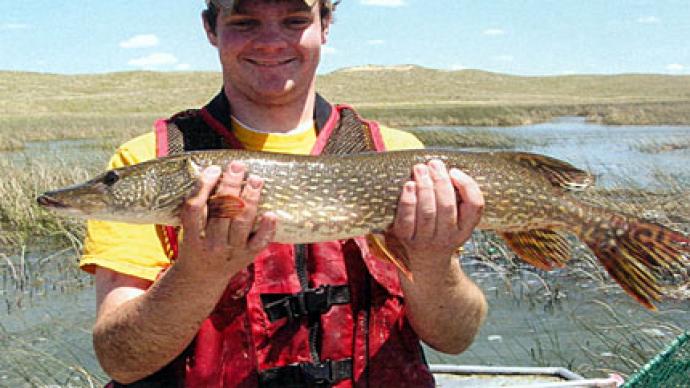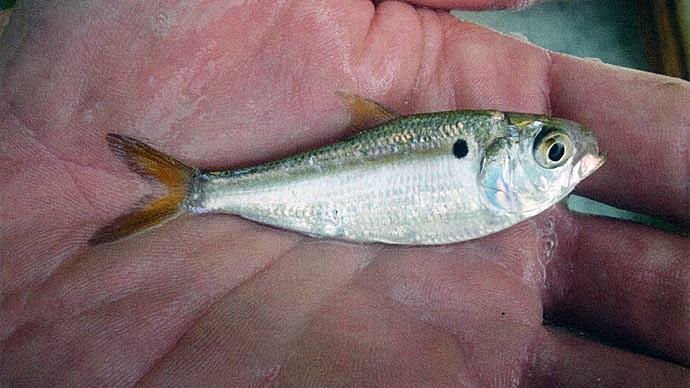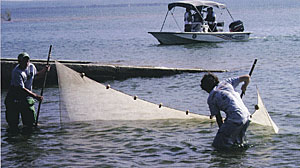
I once thought when school let out and thought summer began, school and learning should be put on the backburner for a while. I saw summer as a break. Don't get me wrong, summer is time for vacations and lazy days, but it is also a time to experience new things outside the realm of a conventional classroom. I now believe learning should never be put on hold, and that is exactly the kind of thing the Texas Brigades encourages.
The Texas Brigades is a five-day summer camp which puts leadership skills and wildlife conservation into perspective. There are six camps, designed for people ages 13 to 17, from which to choose including: North Texas Buckskin Brigades and South Texas Buckskin Brigades, where white-tailed deer management is studied; Rolling Plains Bobwhite Brigades and South Texas Bobwhite Brigades, where quail management is the focus; Feathered Forces Brigades, where quail and turkey management are taught in unison; and the Bass Brigades, where you study fish, lakes, ponds and water conservation.
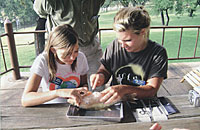
Last year my dad encouraged me to submit an application for the Texas Brigades South Texas Buckskin Brigade. I did and was accepted to the camp as a cadet. I had so much fun last summer at the Buckskin Brigade that I decided to apply to this year's Bass Brigade camp July 7th - 11th at Lake Buchanan, outside Burnet, Texas, about 70 miles northwest of Austin.
In the Texas Brigades, students are called cadets. At the Bass Brigade, we were divided into four groups referred to as "schools" (as in a school of fish). Each school has a School Leader, Assistant School Leader and five cadets. The Assistant School Leader is a former cadet that has completed leadership and conservation projects throughout the year to earn enough points to return to the camp as an ASL. I was assigned to my all-girl school, which we later named the Trophy Big Mouth Anglers.
Immediately after orientation on day one, we went outside to dissect fish with Dr. Tim Bonner from Texas State University and two of his graduate students. We laughingly called it "gutting the fish," but within hours of arriving at camp, we were able to identify most of the external and internal organs of a fish and use this knowledge to age the fish, see what food resources were available to them and judge their overall health.
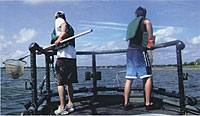
Each of our days at camp was packed with hands-on learning experiences (leaving very little time for sleep). On day two of the camp, we went down to the lake and were given a variety of thirty minute stations to attend. The Trophy Big Mouth Angler's first station was conducting a fish census aboard a TPWD electrofishing boat. (That was, hands down, my favorite camp experience!) On the bow of the boat there were large electrical booms with cables draped into the water. After submerging the cables in water, we would release electrical currents created by an on board generator, to stun the fish, making them float to the top of the water. We would then use dip nets to bring them into the boat, weigh and measure, and then release them back into the water.
Next on our agenda for the day was casting! We were taught lure awareness and how to cast properly. We learned that conservation isn't all about work, it's fun to boot!
After casting, we then went to a beach seining session. We were taught the correct way to use a seine, and that seining is also a way to conduct a fish census and manage fish.
Our next activity of the day was learning about GPS and Sonar aboard a TPWD boat which used those tools to track certain marked points for practice. One of my favorite activities for day three was Diane and Richard Blair of the Dallas Fly Fishers teaching us how to fly fish. They taught us to tie proper fishing knots, how to tie flies, and how to cast a fly rod. We actually had a fly tying and casting competition later in the week!
To further our leadership skills and roles of leadership in conservation issues, one evening, we had a mock stake holder meeting. The issue being addressed was a 20,000-acre lake that had 8,000 acres covered with hydrilla. Each school was assigned a position on this issue. Among the positions were the power plant operators, who were indifferent to the hydrilla problem so long as it didn't interfere with their cooling systems; the bass anglers, who loved the fishing environment created by the hydrilla; the environmentalists, who resisted attempts to control the hydrilla with chemicals; and the homeowners, who felt their property values were at risk which would also directly affect school taxes and the local economy. We had to choose one person from our school to present a 4 minute speech, and propose solutions to the hydrilla problem and defend our position. Our school represented the homeowners and I volunteered to be our spokesperson. Instructors at the school represented the board that I was addressing and they asked questions about our proposal after my presentation. The next day (ironically, I'm sure), Mr. Tim Cook, conservation director from BASS Federation Nation came and spoke about the same real life hydrilla problem facing Lake Conroe (and many other lakes) in Texas today.
This camp was so much more to me than learning about largemouth bass, although that's what the name suggests. It was about leadership and how we can make a difference in our community, state, and even our nation. It was also about conserving and managing our lakes and natural resources because one day, we may not be so fortunate as to have them so readily available. As a society, we take water for granted, thinking that it is always going to be there, but it's not, unless we all do our part to take care of it. We seem to think that wildlife can continue to live here on Earth with all of the horrific changes humans are making each day. What we forget, is that we humans thrive only because of nature, wildlife, and the natural resources of our planet. Without conservation of our natural resources we will struggle to survive in the future.
To get involved with the Texas Brigades or to apply as a cadet for next year's Bass Brigade, go to www.texasbrigades.org, or contact Helen Holdsworth at 210-826-2904 or email her at h-holdsworth@texas-wildlife.org.
Reprinted with permission from Pond Boss Magazine

